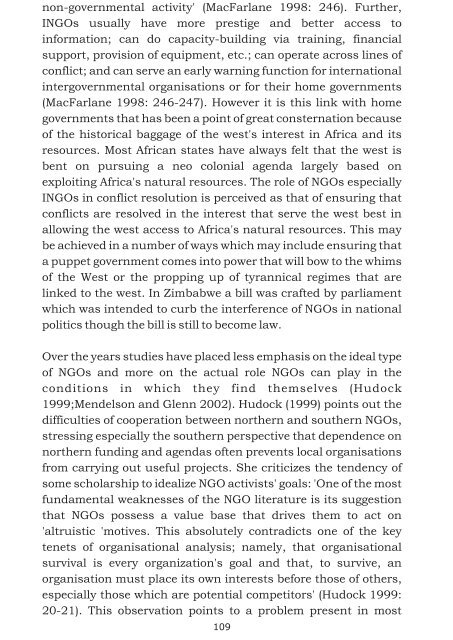Beneficiaries are actors too.pdf - Southern Institute of Peace ...
Beneficiaries are actors too.pdf - Southern Institute of Peace ...
Beneficiaries are actors too.pdf - Southern Institute of Peace ...
Create successful ePaper yourself
Turn your PDF publications into a flip-book with our unique Google optimized e-Paper software.
non-governmental activity' (MacFarlane 1998: 246). Further,<br />
INGOs usually have more prestige and better access to<br />
information; can do capacity-building via training, financial<br />
support, provision <strong>of</strong> equipment, etc.; can operate across lines <strong>of</strong><br />
conflict; and can serve an early warning function for international<br />
intergovernmental organisations or for their home governments<br />
(MacFarlane 1998: 246-247). However it is this link with home<br />
governments that has been a point <strong>of</strong> great consternation because<br />
<strong>of</strong> the historical baggage <strong>of</strong> the west's interest in Africa and its<br />
resources. Most African states have always felt that the west is<br />
bent on pursuing a neo colonial agenda largely based on<br />
exploiting Africa's natural resources. The role <strong>of</strong> NGOs especially<br />
INGOs in conflict resolution is perceived as that <strong>of</strong> ensuring that<br />
conflicts <strong>are</strong> resolved in the interest that serve the west best in<br />
allowing the west access to Africa's natural resources. This may<br />
be achieved in a number <strong>of</strong> ways which may include ensuring that<br />
a puppet government comes into power that will bow to the whims<br />
<strong>of</strong> the West or the propping up <strong>of</strong> tyrannical regimes that <strong>are</strong><br />
linked to the west. In Zimbabwe a bill was crafted by parliament<br />
which was intended to curb the interference <strong>of</strong> NGOs in national<br />
politics though the bill is still to become law.<br />
Over the years studies have placed less emphasis on the ideal type<br />
<strong>of</strong> NGOs and more on the actual role NGOs can play in the<br />
conditions in which they find themselves (Hudock<br />
1999;Mendelson and Glenn 2002). Hudock (1999) points out the<br />
difficulties <strong>of</strong> cooperation between northern and southern NGOs,<br />
stressing especially the southern perspective that dependence on<br />
northern funding and agendas <strong>of</strong>ten prevents local organisations<br />
from carrying out useful projects. She criticizes the tendency <strong>of</strong><br />
some scholarship to idealize NGO activists' goals: 'One <strong>of</strong> the most<br />
fundamental weaknesses <strong>of</strong> the NGO literature is its suggestion<br />
that NGOs possess a value base that drives them to act on<br />
'altruistic 'motives. This absolutely contradicts one <strong>of</strong> the key<br />
tenets <strong>of</strong> organisational analysis; namely, that organisational<br />
survival is every organization's goal and that, to survive, an<br />
organisation must place its own interests before those <strong>of</strong> others,<br />
especially those which <strong>are</strong> potential competitors' (Hudock 1999:<br />
20-21). This observation points to a problem present in most<br />
109


